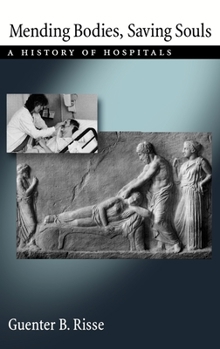Mending Bodies, Saving Souls: A History of Hospitals
Select Format
Select Condition 
Book Overview
By chronicling the transformations of hospitals from houses of mercy to tools of confinement, from dwellings of rehabilitation to spaces for clinical teaching and research, from rooms for birthing and dying to institutions of science and technology, this book provides a historical approach to understanding of today's hospitals. The story is told in a dozen episodes which illustrate hospitals in particular times and places, covering important themes...
Format:Hardcover
Language:English
ISBN:0195055233
ISBN13:9780195055238
Release Date:April 1999
Publisher:Oxford University Press, USA
Length:752 Pages
Weight:2.80 lbs.
Dimensions:1.7" x 6.7" x 9.6"
Customer Reviews
3 ratings
Want to know why hospitals are the way they are?
Published by Thriftbooks.com User , 15 years ago
I used this book as a source for a research paper on French hospitals in the 17th and 18th centuries. I often got caught up in the other time periods, though, because there was so much to learn. The author covers a lot of ground, in terms of the shifting role of hospitals over time and geography. He includes the training of medical professionals, the involvement of religious personnel and organizations, dietary and daily regimens, diagnosis and treatments, the effects of politics, economics, religion, education, and so forth on how hospitals operated and were viewed. I bought this book for my mother-in-law (a retired RN and nursing instructor) as a Mother's Day gift, and she loves it. I want a copy for myself, because it helped me understand why hospitals are the way they are today, and to appreciate just what we do have available.
Mending Bodies, Saving Souls
Published by Thriftbooks.com User , 21 years ago
Beautifully produced thick book with marvelous details and engrossing flow of information. Thinking of the labor expended in writing such a encommpassing volume leaves me in awe of the superb quality of the author's scholarship.There are over 1000 references, many in languages other than English. Since a history of hospitals cannot be separated from the history of medicine, obviously some overlap occurrs, which is welcome. I recommend this book for the serious reader.
A compassionate, informative history of medicine, hospitals.
Published by Thriftbooks.com User , 25 years ago
Hospitalitas, the Latin root for our word hospital, implies a relationship, a sharing between the visitor and caregiver. In his new book, Mending Bodies, Saving Souls, medically trained historian Guenter B. Risse traces the evolution of hospitals from their early mission as humble houses of mercy to the role of some today as arenas of nearly miraculous technical feats. Throughout the book Risse suggests that today's emphasis on diagnostic techniques and surgical specialties often overshadows and even undermines the capacity for compassionate caregiving. Risse, MD, PhD, is professor and chair of history of health sciences at the University of California San Francisco. He was trained as a medical doctor in Peronist Argentina and earned a doctorate in history at the University of Chicago. He brings both spheres of knowledge to his ambitious project. The chapters provide a series of portraits at the threshold of different medical milestones - the discovery of the stethoscope and its role in diagnosing tuberculosis; the emergence of autopsies to help pinpoint causes of disease and bring the possibility of preventing them; the first amputation under general anesthesia; the early use of antisepsis at the Royal Infirmary in Edinburgh; the modern development of organ transplant surgery and post-operative care; and the very real drama played out on the first AIDS ward in the early 1980s. After sketching their origins in Byzantium, Risse portrays hospitals in the Middle Ages as houses of refuge and dying, where moral and spiritual concerns prevailed and where caregivers were expected to fast and do penance. The house of mercy gave way during the Renaissance to the house of rehabilitation, borne by the conviction that the sick or wounded might be healed, not merely cared for. As scientific understanding grew, the house of rehabilitation became the house of cure. In our time, Risse writes, the top hospitals focus on teaching and research, where the newest, boldest techniques are developed and proven. They have become houses of science -- a long journey from their origin as houses of mercy and refuge. He wonders if the technical gains in the "medicosurgical" era can't allow more room for the proven gifts of more compassionate caregiving. As the book reaches the present day, Risse offers a chapter chronicling the superb skill, insight and persistence of the pioneers in the field of organ transplantation. He follows three young women as they prepare for and recover from kidney transplants. In an environment where the extraordinary life-saving skill of surgeons is prominent, mutual support among the three patients turns out to be invaluable to help them cope with pre-operative anxiety and difficult recoveries. One can't separate personal, emotional support from the healing experience, Risse seems to be saying. The book's final chapter relates the shifting treatment strategies and innovative caregiving employe





